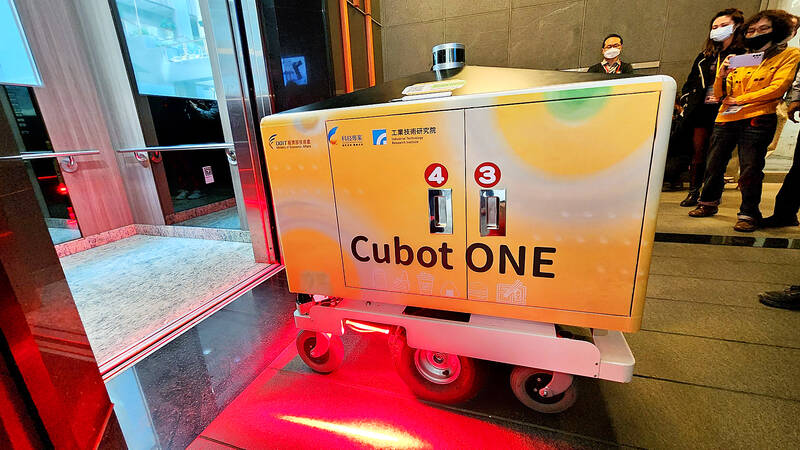A vehicle dubbed “Taiwan’s first food courier robot” is to undergo a 10-month trial at the Kaohsiung Software Park (高雄軟體園區) from Wednesday next week, the Industrial Technology Research Institute (ITRI, 工研院) said yesterday.
While robots supplementing waiters at restaurants is not unheard of, the autonomous mobile robot, also known as Cubot ONE, is set apart by its ability to deliver food to workers in nearby offices, the government-funded institute said in a statement.
Cubot ONE would be deployed at the park’s 7-Eleven convenience store, from where it would deliver orders placed by workers in the park’s three office buildings, the institute said.

Photo: CNA
The institute first unveiled the robot at the Meet Greater South expo in Kaohsiung last year, after which the Cubot ONE’s developers spent six months upgrading it, said Chang Neng-kai (張能凱), a senior specialist in the Ministry of Economic Affairs’ Department of Industrial Technology.
Cubot ONE can weave its way through crowded spaces, and enter and exit elevators, Chang said.
Cubot ONE would deliver orders placed through 7-Eleven’s Foodomo food delivery platform, he said.
Global robot sales have been growing in the past few years, with logistics robots accounting for 34 percent of overall sales, Chang said.
Global production value of robot sales is expected to reach US$49.4 billion in 2027, he said.
Cubot ONE would mark the latest example of artificial intelligence applications in the ministry’s Taiwan Startup Terrace technology cluster in New Taipei City’s Linkou District (林口), after the ministry conducted successful trials of uncrewed aerial vehicles and autonomous ships, Chang said.
Chang said he hopes that Cubot ONE would operate in “smart” stores, hotels and restaurants in the future.
Powered by cellular-vehicle-to-everything technology, wireless Internet connectivity, 3D positioning, a navigation system and a patented chassis, Cubot ONE can receive orders, navigate through traffic, circumvent or surmount obstacles and send notifications to customers, ITRI executive vice president Chang Pei-zen (張培仁) said.
Cubot ONE is expected to save workers in the park an average of 10 to 15 minutes per order, the institute said.

Taiwan Semiconductor Manufacturing Co (TSMC, 台積電) would not produce its most advanced technologies in the US next year, Minister of Economic Affairs J.W. Kuo (郭智輝) said yesterday. Kuo made the comment during an appearance at the legislature, hours after the chipmaker announced that it would invest an additional US$100 billion to expand its manufacturing operations in the US. Asked by Taiwan People’s Party Legislator-at-large Chang Chi-kai (張啟楷) if TSMC would allow its most advanced technologies, the yet-to-be-released 2-nanometer and 1.6-nanometer processes, to go to the US in the near term, Kuo denied it. TSMC recently opened its first US factory, which produces 4-nanometer

PROTECTION: The investigation, which takes aim at exporters such as Canada, Germany and Brazil, came days after Trump unveiled tariff hikes on steel and aluminum products US President Donald Trump on Saturday ordered a probe into potential tariffs on lumber imports — a move threatening to stoke trade tensions — while also pushing for a domestic supply boost. Trump signed an executive order instructing US Secretary of Commerce Howard Lutnick to begin an investigation “to determine the effects on the national security of imports of timber, lumber and their derivative products.” The study might result in new tariffs being imposed, which would pile on top of existing levies. The investigation takes aim at exporters like Canada, Germany and Brazil, with White House officials earlier accusing these economies of

GREAT SUCCESS: Republican Senator Todd Young expressed surprise at Trump’s comments and said he expects the administration to keep the program running US lawmakers who helped secure billions of dollars in subsidies for domestic semiconductor manufacturing rejected US President Donald Trump’s call to revoke the 2022 CHIPS and Science Act, signaling that any repeal effort in the US Congress would fall short. US Senate Minority Leader Chuck Schumer, who negotiated the law, on Wednesday said that Trump’s demand would fail, while a top Republican proponent, US Senator Todd Young, expressed surprise at the president’s comments and said he expects the administration to keep the program running. The CHIPS Act is “essential for America leading the world in tech, leading the world in AI [artificial

REACTIONS: While most analysts were positive about TSMC’s investment, one said the US expansion could disrupt the company’s supply-demand balance Taiwan Semiconductor Manufacturing Co’s (TSMC, 台積電) new US$100 billion investment in the US would exert a positive effect on the chipmaker’s revenue in the medium term on the back of booming artificial intelligence (AI) chip demand from US chip designers, an International Data Corp (IDC) analyst said yesterday. “This is good for TSMC in terms of business expansion, as its major clients for advanced chips are US chip designers,” IDC senior semiconductor research manager Galen Zeng (曾冠瑋) said by telephone yesterday. “Besides, those US companies all consider supply chain resilience a business imperative,” Zeng said. That meant local supply would